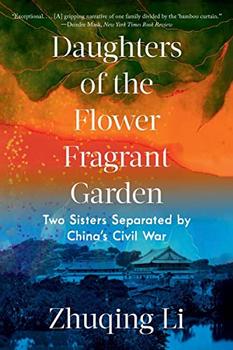Book Club Discussion Questions
In a book club? Subscribe to our Book Club Newsletter and get our best book club books of 2025!
For supplemental discussion material see our Beyond the Book article, China and Taiwan: A Short Primer and our BookBrowse Review of Daughters of the Flower Fragrant Garden.
Please be aware that this discussion guide will contain spoilers!
-
In telling the story of Jun and Zhen, Zhuqing Li's Daughters of the Flower Fragrant Garden imparts an enormous amount of historical and political information. How does focusing on an individual's story change or reconfigure your understanding of political and historical events?
-
In Longdi, Zhen's son, Jiyue, stops eating when he realizes that each mouthful of food that he eats is one mouthful less for the impoverished villagers, that "kindness to him demanded a huge sacrifice from these poor people" (p. 210). Does kindness always demand a sacrifice? Why were the villagers willing to deprive themselves for Jiyue?
-
What preconceptions about China, Taiwan, and their histories did you have going into Daughters of the Flower Fragrant Garden? How has your perspective changed? Did reading this book raise new questions for you? If so, what are they?
-
The idea of a complete or whole family comes up again and again after Jun becomes trapped in Jinmen by the new border between China and Taiwan. What does a "complete" family mean to Zhen? To Jun? To their two mothers? What is a "complete" family to you?
-
How do you view or judge Zhen's choices to work with the Communist government, join the Communist Party, and become a leader of the "family planning" sterilization effort in mainland China?
-
At the end of the book, Zhuqing Li writes about Jun and Zhen's last meeting, "They had both climbed mountains, and yet they knew that they would remain on their separate mountain tops, Jun the devout Christian, Zhen a member of the world's most enduring and powerful Communist Party" (p. 346). What about these "mountain tops" separates the two sisters? How are they able to connect despite their vastly different experiences? Why does Li write this about their final meeting?
-
Is there someone in your family who embodies your family story in the way that Jun and Zhen do for Li and the Chen family? If so, how?
-
Are you surprised by the ways in which both sisters embraced the political ideologies of their respective homes? Is this something you notice people doing in the world around you?
-
When Jun finally returns to Fuzhou, she is forced to cede her traditional title of Big Aunt to Zhen, who filled that role in Jun's long absence. What is Jun's new role? How do you think the author would describe the role of Jun and Zhen in her and her family's lives?
-
Which of the two sisters in Daughters of the Flower Fragrant Garden do you relate to and identify with most? Explain.
-
Li describes a profound sense of recognition when she sees the only surviving photograph of her grandfather in his ancestral village of Luozhou. Have you ever felt something similar? Describe your experience.
-
What positive lessons do you think Zhen learned from the ideology of Communist China? What positive lessons do you think Jun learned from nationalist Taiwan and the United States of America?
-
The course of Jun and Zhen's lives were shaped by enormous political events beyond their control. What large political and historical events have shaped your life?
-
After being offered membership in the Communist Party, Zhen "felt a freedom that she had not tasted for a very long time" (p. 279). How would you characterize the freedom Zhen felt? Does it match your understanding of freedom? Explain.
- In different ways, Jun and Zhen are motivated by their concepts of family and tradition. What ideas about family and tradition do you carry with you? Where does your understanding of family and tradition come from?
Unless otherwise stated, this discussion guide is reprinted with the permission of W.W. Norton & Company.
Any page references refer to a USA edition of the book, usually the trade paperback version, and may vary in other editions.
